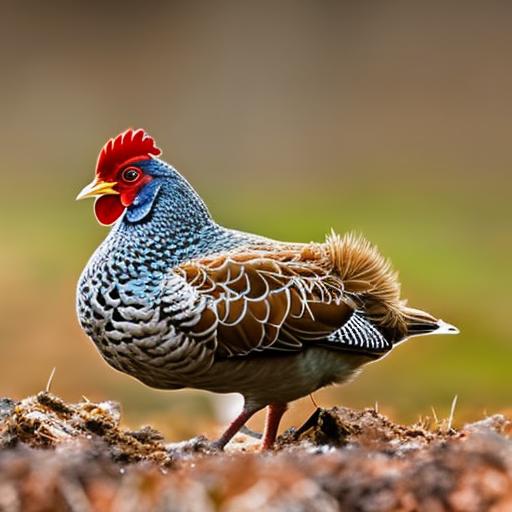Keeping chickens has become increasingly popular in recent years, as more people are interested in sustainable living and producing their own food. However, it is important to carefully consider the number of chickens to keep before diving into this endeavor. The number of chickens you keep will depend on various factors, such as available space, local regulations, and personal needs and preferences. By taking these factors into account, you can ensure that your chickens have a comfortable and healthy living environment.
Key Takeaways
- Consider factors such as space, time, and resources before deciding on the number of chickens to keep.
- The ideal size of a chicken coop should provide at least 4 square feet of space per chicken.
- Adequate space is crucial for chicken health and egg production.
- Overcrowding can lead to health issues and decreased egg production in chickens.
- A small backyard can still accommodate a small flock of chickens, providing numerous benefits such as fresh eggs and pest control.
Factors to consider before deciding on the number of chickens to keep
Before deciding on the number of chickens to keep, there are several important factors that need to be considered. One of the most crucial factors is the available space. Chickens require a certain amount of space to move around, exercise, and engage in natural behaviors. It is recommended to provide at least 4 square feet of space per chicken in the coop and 10 square feet per chicken in the outdoor run.
Another factor to consider is local regulations. Some areas have restrictions on the number of chickens that can be kept in residential areas. It is important to check with your local authorities to ensure that you are in compliance with any regulations or ordinances.
Personal needs and preferences should also be taken into account when deciding on the number of chickens to keep. Consider how many eggs you and your family consume on a regular basis. If you have a small family, you may only need a few chickens to meet your egg needs. On the other hand, if you plan on selling eggs or raising chickens for meat, you may need a larger flock.
The ideal size of a chicken coop
The size of your chicken coop will depend on the number of chickens you plan to keep. As mentioned earlier, it is recommended to provide at least 4 square feet of space per chicken in the coop. This means that if you plan on keeping 6 chickens, your coop should be at least 24 square feet in size.
When designing and building a chicken coop, it is important to consider the layout and functionality. The coop should have proper ventilation to prevent the buildup of ammonia and moisture, which can lead to respiratory problems in chickens. It should also have nesting boxes for the hens to lay their eggs and roosting bars for them to perch on at night.
Additionally, the coop should be predator-proof to keep your chickens safe from predators such as raccoons, foxes, and rats. This can be achieved by using sturdy materials, burying wire mesh around the perimeter of the coop, and ensuring that there are no gaps or holes where predators can enter.
The importance of adequate space for chickens
Providing enough space for your chickens is crucial for their overall health and well-being. Chickens are active animals that require space to move around, stretch their wings, and engage in natural behaviors such as scratching and dust bathing. When chickens are overcrowded, they become stressed and may exhibit aggressive behaviors towards each other.
Overcrowding can also lead to health problems in chickens. When chickens are kept in close quarters, it is easier for diseases to spread. Chickens that are overcrowded are more susceptible to respiratory infections, parasites, and other illnesses. Additionally, overcrowding can lead to feather pecking and cannibalism, where chickens peck at each other’s feathers or even injure each other.
Furthermore, overcrowding can have a negative impact on egg production. When chickens are overcrowded, they may not have enough space to lay their eggs comfortably. This can result in stress and decreased egg production. Additionally, overcrowding can lead to lower quality eggs, as the stress and lack of space can affect the hens’ overall health and well-being.
The impact of overcrowding on chicken health and egg production
Overcrowding can have serious consequences for the health and well-being of your chickens. One of the most common problems that arise from overcrowding is stress. When chickens are overcrowded, they become stressed and may exhibit abnormal behaviors such as feather pecking, cannibalism, and aggression towards each other. This can lead to injuries and even death.
Overcrowding also increases the risk of disease transmission among chickens. When chickens are kept in close quarters, it is easier for diseases to spread. This can result in respiratory infections, parasites, and other illnesses that can have a negative impact on the overall health and productivity of your flock.
In addition to health problems, overcrowding can also lead to decreased egg production. When chickens are overcrowded, they may not have enough space to lay their eggs comfortably. This can result in stress and decreased egg production. Furthermore, the stress and lack of space can affect the hens’ overall health and well-being, which can also impact egg quality.
How many chickens can you keep in a small backyard?

If you have a small backyard, you may be wondering how many chickens you can keep. While space is limited, it is still possible to keep a small flock of chickens in a small backyard. The key is to find the right balance between the size of your backyard, the size of the chicken coop, and the needs of the chickens.
As mentioned earlier, it is recommended to provide at least 4 square feet of space per chicken in the coop. This means that if you have a small backyard and want to keep 4 chickens, your coop should be at least 16 square feet in size. Additionally, you should provide at least 10 square feet per chicken in the outdoor run.
It is also important to consider the needs of the chickens when determining how many you can keep in a small backyard. Chickens require access to fresh air, sunlight, and outdoor space to engage in natural behaviors. If your backyard is small, you may need to provide additional enrichment activities, such as hanging treats or providing toys, to keep your chickens entertained and stimulated.
The benefits of keeping a small flock of chickens
While it may be tempting to keep a large flock of chickens, there are several advantages to keeping a small flock. One of the main benefits is easier management. With a smaller flock, it is easier to keep track of each chicken’s health and behavior. It is also easier to provide individual attention and care to each chicken.
Another advantage of keeping a small flock is lower costs. With fewer chickens, you will need less feed, bedding, and other supplies. This can result in significant savings over time. Additionally, a smaller flock will produce fewer eggs, which means less waste if you are unable to consume all the eggs yourself.
Despite having a small flock, you can still have enough eggs for your family. For example, if you have 4 chickens and each chicken lays an average of 5 eggs per week, you will have 20 eggs per week. This is more than enough for most families. If you find that you have excess eggs, you can always share them with friends and neighbors or sell them locally.
The disadvantages of keeping too many chickens
While there are advantages to keeping a small flock of chickens, there are also disadvantages to keeping too many chickens. One of the main disadvantages is increased costs. With a larger flock, you will need more feed, bedding, and other supplies. This can add up quickly and become expensive.
Another disadvantage of keeping too many chickens is more waste. Chickens produce manure on a daily basis, and with a larger flock, there will be more waste to manage. Proper waste management is important for maintaining a clean and healthy living environment for your chickens.
Managing a larger flock can also be more difficult. With more chickens, it can be challenging to keep track of each chicken’s health and behavior. It may also be more difficult to provide individual attention and care to each chicken. Additionally, a larger flock may require more time and effort to manage, such as cleaning the coop, collecting eggs, and providing enrichment activities.
Tips for managing a larger flock of chickens
If you decide to keep a larger flock of chickens, there are several tips that can help you manage them effectively. First and foremost, it is important to provide enough space for your chickens. As mentioned earlier, it is recommended to provide at least 4 square feet of space per chicken in the coop and 10 square feet per chicken in the outdoor run.
Proper nutrition is also crucial for a larger flock. Make sure to provide a balanced diet that includes a mix of grains, protein, vitamins, and minerals. It is also important to provide fresh water at all times.
Regular monitoring is essential for managing a larger flock. Keep an eye out for any signs of illness or injury, such as changes in behavior, decreased egg production, or abnormal droppings. If you notice any issues, take immediate action to address them.
Having a plan for managing a larger flock is also important. This includes having a system in place for cleaning the coop, collecting eggs, and providing enrichment activities. It may also be helpful to have a backup plan in case of emergencies or unexpected events.
Finding the right balance for your chicken coop and flock size
In conclusion, when deciding on the number of chickens to keep, it is important to consider factors such as available space, local regulations, and personal needs and preferences. By taking these factors into account, you can ensure that your chickens have a comfortable and healthy living environment.
It is recommended to provide at least 4 square feet of space per chicken in the coop and 10 square feet per chicken in the outdoor run. This will allow your chickens to move around, exercise, and engage in natural behaviors. Overcrowding can lead to health problems and decreased egg production, so it is important to find the right balance for your chicken coop and flock size.
Whether you choose to keep a small flock or a larger flock, there are advantages and disadvantages to consider. A small flock may be easier to manage and have lower costs, while a larger flock may provide more eggs but require more time and effort to manage. Ultimately, the right balance will depend on your individual circumstances and preferences.
If you’re considering raising chickens, you may be wondering how many chickens you should keep. It’s an important decision that can impact the health and well-being of your flock. To help you determine the best number of chickens to keep, I recommend checking out this informative article on Poultry Wizard’s website: “The Ultimate Guide to Choosing the Right Number of Chickens for Your Flock.” This article provides valuable insights and tips on factors to consider, such as space requirements, breed characteristics, and your own personal goals. It’s a must-read for anyone embarking on their chicken-keeping journey.
FAQs
What is the best number of chickens to keep?
The best number of chickens to keep depends on various factors such as available space, purpose of keeping chickens, and personal preferences.
How much space do chickens need?
Chickens need at least 4 square feet of indoor space and 10 square feet of outdoor space per bird to live comfortably.
What is the purpose of keeping chickens?
People keep chickens for various reasons such as for eggs, meat, pest control, or as pets.
How many eggs can one chicken lay in a day?
On average, one chicken can lay one egg per day.
How much does it cost to keep chickens?
The cost of keeping chickens varies depending on factors such as the number of chickens, type of feed, and housing. On average, it can cost around $300 to $500 per year to keep a small flock of chickens.
What are the benefits of keeping chickens?
Keeping chickens can provide fresh eggs, meat, pest control, and fertilizer for gardens. It can also be a fun and educational hobby for families.
Meet Walter, the feathered-friend fanatic of Florida! Nestled in the sunshine state, Walter struts through life with his feathered companions, clucking his way to happiness. With a coop that’s fancier than a five-star hotel, he’s the Don Juan of the chicken world. When he’s not teaching his hens to do the cha-cha, you’ll find him in a heated debate with his prized rooster, Sir Clucks-a-Lot. Walter’s poultry passion is no yolk; he’s the sunny-side-up guy you never knew you needed in your flock of friends!







